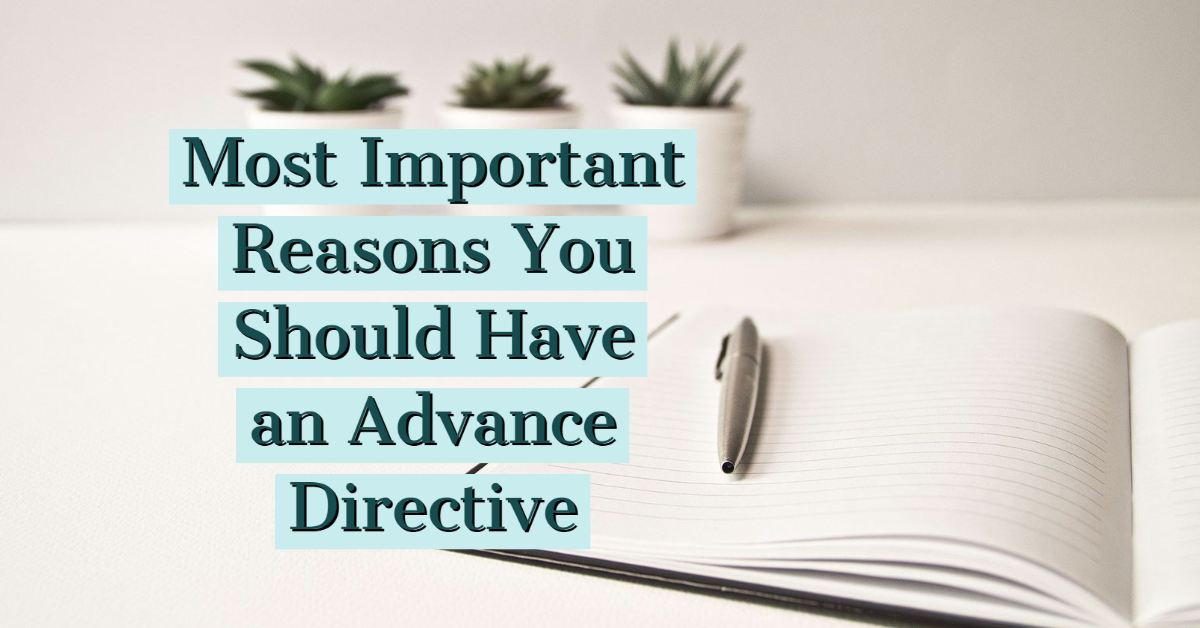What are Advance Directives?
Advanced directives are legal documents that direct your health care based on your specific preferences. This legal document is often comprised of a healthcare agent/power of attorney and a living will.
These documents are very important to have in order. if something were to happen to you and you can’t communicate or make your own decisions, healthcare providers will not know how to treat you.
I encourage all of my patients to complete Advance Directives by the time they turn 65. These legal documents are so important! Obviously you don’t have to wait until you turn 65 to draw up an advance directive. In fact, it’s a great idea to plan ahead! At any age you can complete an advanced directive and review it every year. You can change it at any time.
One of the most important things I tell my patients about advance directives, is that they are not effective until 1 or 2 physicians determine that you lack capacity or are unable to make decisions. It all depends on the clause in the healthcare power of attorney paperwork.
This means that whomever you appoint, CANNOT make decisions on your behalf as long as you have the capacity to make them yourself. Also, Advance Directives are for Healthcare Decisions ONLY. They do not include financial decisions. You will need to complete a separate power of attorney for financial decisions.
Why do I need an Advance Directive?
You will receive medical care even if you don’t have an advance directive. However, if you are unable to communicate for yourself or are not cognitively sound to make decisions, physicians will need to know how to direct your care. Often times they will look at next of kin to make decisions about your health care needs and treatment. Without a healthcare advance directive, the next of kin may not know what you will want and also may have limited decision making power.
In some states, next of kin may not be allowed to make decisions because the law requires a legal healthcare power of attorney or Guardian.
If you require rehab or long term placement, facilities require a healthcare power of attorney or Guardianship paperwork to admit you for care. This happens a lot for individuals who are diagnosed with dementia or Alzheimer’s disease and had not completed this paperwork. It makes it difficult get into a care facility.
If you are looking into memory care facility options, check out “How Memory Care Facilities are Set Up“
What Happens if you don’t make an advance directive?
You will continue to get medical care, but it may not be the care or treatment you want. A physician cannot stop full treatment without direction from an advance directive and healthcare power of attorney or Guardian. If physicians are unable to contact or locate family to act on your behalf, often times the courts have to get involved to appoint a legal Guardian. The legal Guardian will then act as your decision maker.
Below are 2 examples of what could happen if you don’t have a healthcare power of attorney designated:
Scenario #1
You get into a car accident and end up on a breathing machine in the ICU. You are in a coma and there is little to no chance for recovery. If you don’t have an healthcare power of attorney or Guardian, and family cannot be reached, you will stay in this vegetative state. This could continue until a Guardian is appointed by the courts. This can take several weeks to months varying by county.
Scenario #2
You are in your 70’s and have severe dementia. You can no longer live alone and are requiring full time help. You don’t have a healthcare power of attorney and your family is not involved with your life.
You end up in the hospital and are unsafe to go back home. You are needing to go to a nursing home and do not have decision making capacity.
The hospital now has to go through the courts to get a court appointed Guardian. This Guardian now decides where you go for nursing home care on your behalf.
How do I get an advance directive?
You can get the advance directive paperwork from a social worker, a healthcare provider, an attorney or even online.
Below are some websites you can find and download the paperwork for free. Check out our Resources page for more!
https://www.aarp.org/caregiving/financial-legal/free-printable-advance-directives/
https://www.practicalbioethics.org/resources/caring-conversations.html
https://theconversationproject.org/
What should be included in my advance directive?
- Appointment of healthcare proxy decision maker
- DNR wishes
- Life sustaining treatments
- Organ and tissue donation
- If you have a serious mental health diagnosis, you may want to write down your preferences for mental health care and treatment.
- Any social, cultural or faith-based preferences
- A clause allowing the healthcare proxy to handle care of deceased body and funeral arrangements
What are Life Sustaining Treatments?
Life sustaining are any treatments used to keep someone alive. This can include:
- surgery
- invasive diagnostic tests
- IV antibiotics
- CPR
- Intubation
- Ventilator support (a breathing machine)
- blood infusions
- kidney dialysis
- heart regulating drugs
- steroid therapy
- stimulants for treatment of heart failure
- artificial hydration and nutrition (such as IV nutrition or tube feeds)
Does the Advance Directive need to be notarized?
Short answer is Yes. Some states do not require it to be notarized but many states do. It’s better to get it notarized so it can be utilized in any state. If you are already in the hospital, most of the time there are notaries available in the hospital to notarize healthcare directives.
You can also go to a local bank or if you are using an attorney they should have access to a notary. There are also mobile notaries you can contact who can meet you wherever you are to notarize documents for a small fee.
Do Advance Directives expire?
No, they do not expire. Your healthcare power of attorney and living will remain in effect until you change it or create a new one. Any new advance directive you create voids the previous one. Make sure you provide any new or updated advance directives to your healthcare provider so they can keep their information up to date.
I would also recommend providing copies to your family members just in case you lose your original or something happens to it.
The Bottom Line
Advance Directives are legal documents that appoints someone to make healthcare decisions on your behalf. They also provide guidance for your healthcare proxy and healthcare providers to give you the care you desire.
Having these documents in place as early as possible will help your healthcare providers to follow your desires for care now and in the future. It will also relieve a huge burden from your loved ones when they are informed about what care you would want.
It is very stressful for a family member to have to guess what you would want in a crisis situation. Family members are both worried that they won’t make the best decision for you in that moment. If they have direction that is written form them to follow, it will help ease their decision making. This will allow them to be more emotionally available for you and other loved ones during a crisis.


4 Responses
Hi Tabi,
This post is a great read and it’s so informative. Showing the importance of getting the advance directive early.
This is so true. People don’t want to think about these things, but they tend to leave a giant mess behind them when they become incapacitated.
These are good tips for planning that everyone should be thinking about. Very smart to be prepared!
I wish to give my only daughter, Cynthia E. Green, total and final full medical decisions and authority concerning my health and medical care, in the event that that I am unable to make the decisions myself.